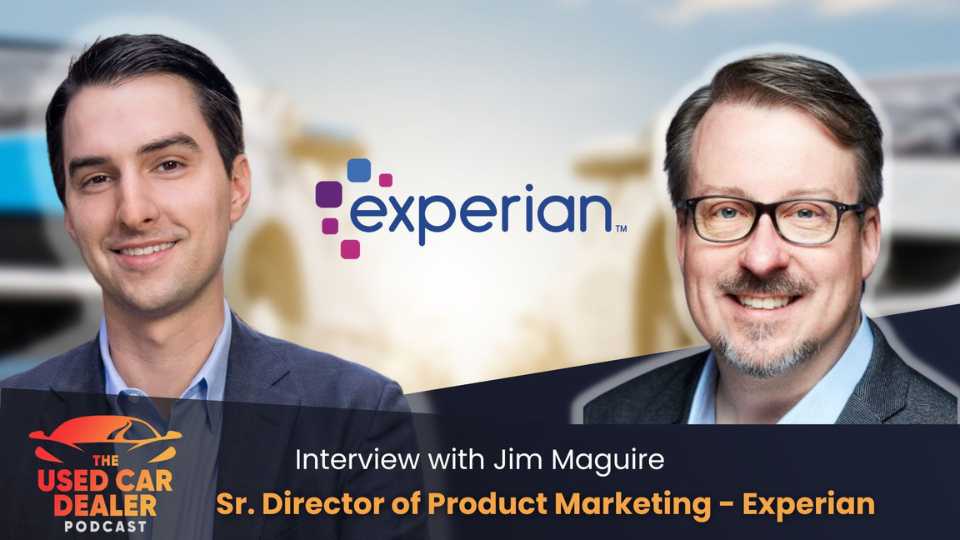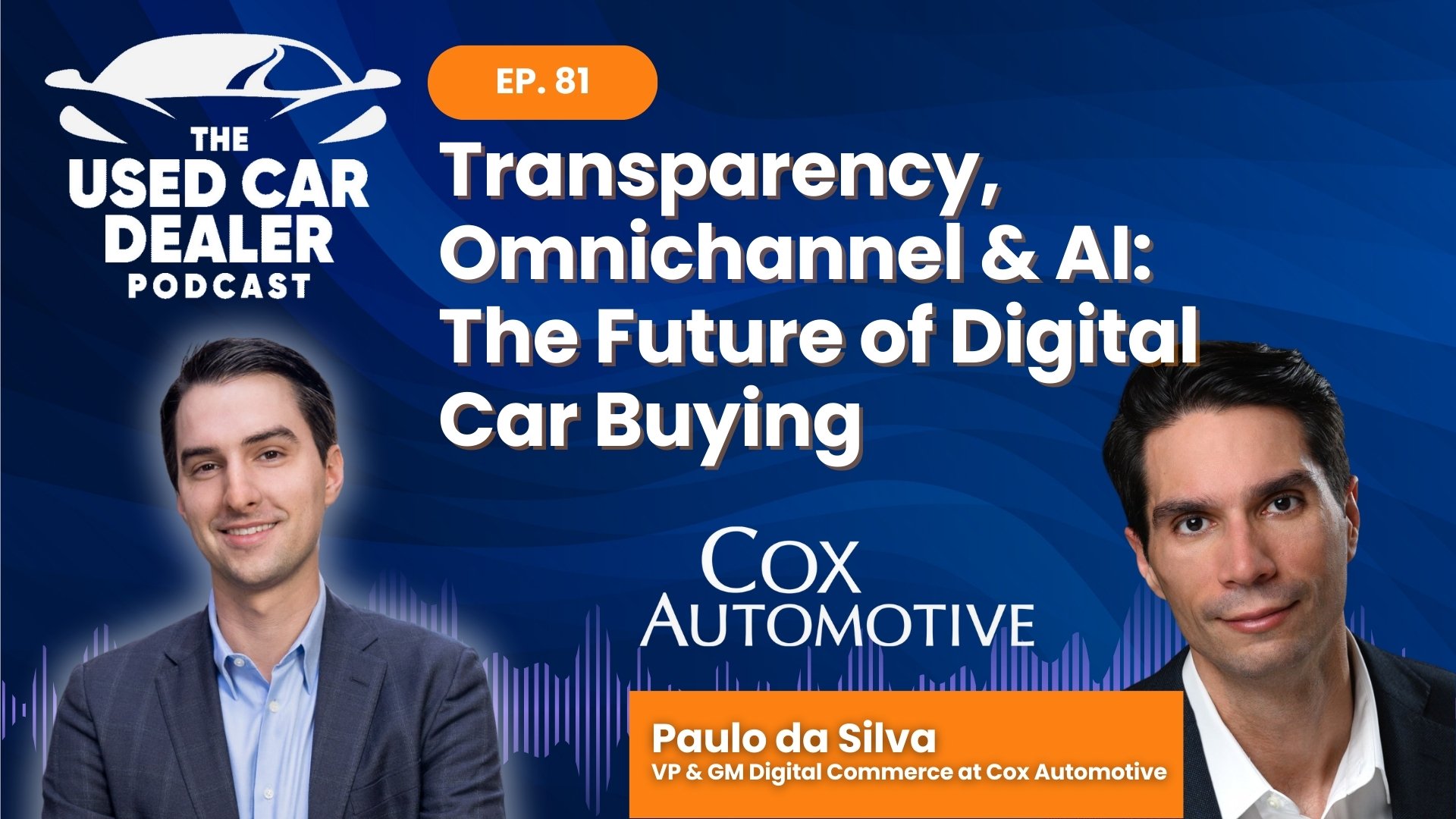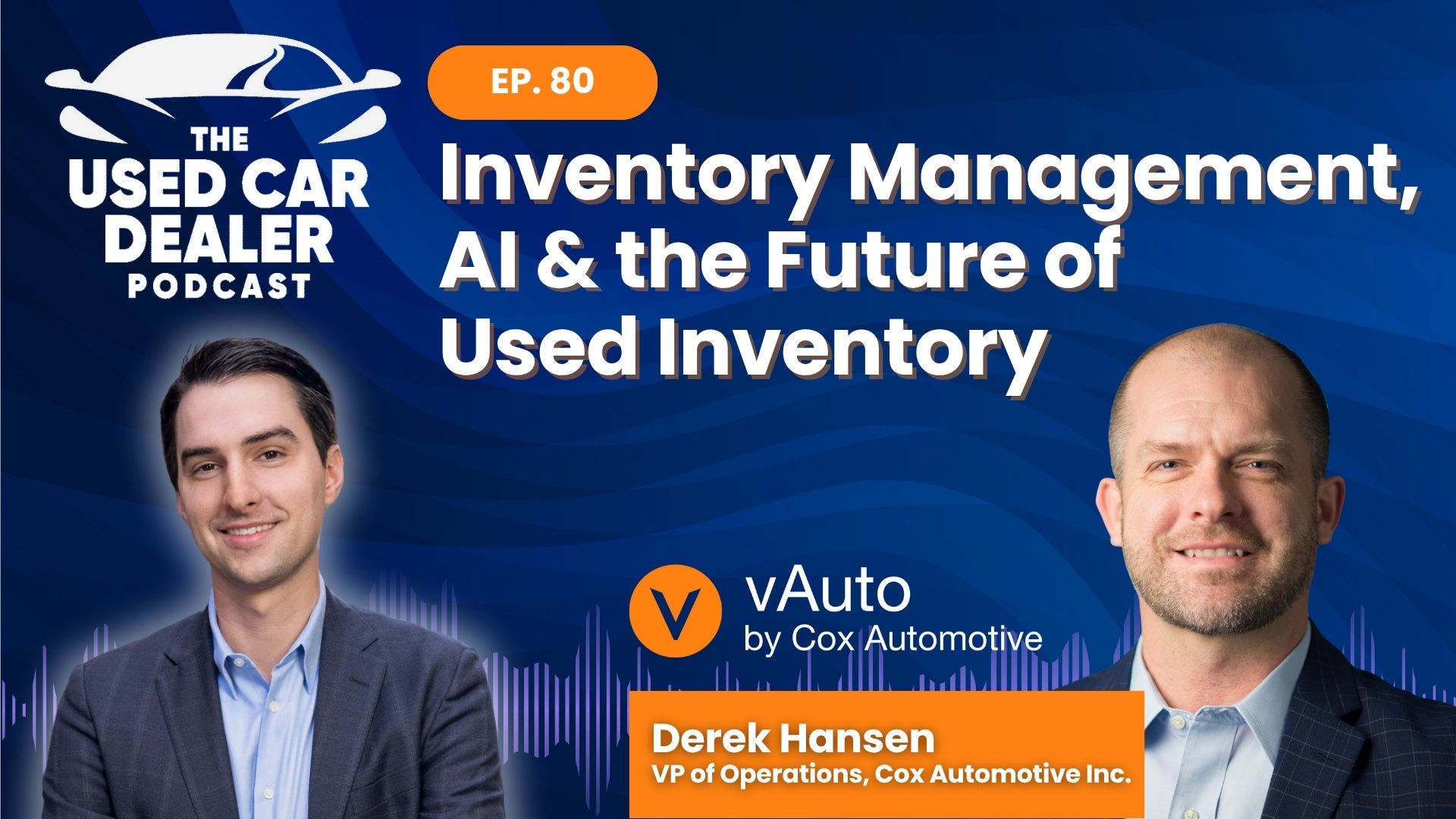In this episode of the Used Car Dealer Podcast, Zach interviews Jim Maguire, Experian’s senior director of product marketing for automotive. They discuss dealership fraud, ways to prevent it at your store, and Experian’s latest report on fraud in the industry.
Zach: Zach here, back after the summer break with another episode of the Used Car Dealer podcast. Today, we have Jim McGuire, experienced senior director of product marketing for automotive at Experian. We're going to discuss dealership fraud, ways to prevent it at your store, and Experian's latest report on fraud in the industry.
Jim: So, to kind of get things started, let's talk about my background in the industry and what led me to Experian. Nice to meet you, Zach. I've watched your podcast in the past and really enjoyed it. My background? It all started with the internet. I was working at an internet development company back when it was a new thing. I was hired by a company called EDP Dealer Services to start a product. That product became autotrader.com. I jumped right in. I started at the end of 1995 and presented at NADA 1996. I have been in the auto industry ever since and really focused on e-commerce. After I left there, being in Chicago, I went to another local player and helped launch cars.com. I've been doing automotive e-commerce since it was a thing. I've worked with dealers, OEMs, and lenders that entire time, building products and bringing them to the market.
Zach: Wow, it sounds like you've been on the ground floor of a lot of really interesting and important auto software and e-commerce companies in the space. Here's an icebreaker for you: tell us about the first car you ever got, whether that was in high school, college, or later in life.
Jim: Oh, it was in high school. I had the pleasure of driving my family's 1977 Chevy Malibu Classic station wagon. It was light blue with wood paneling on the sides, and it was enormous. I once drove 10 high school friends in that car to a concert. It was a big one. Very cool.
Zach: Let's kind of kick-off by asking: what are the most common forms of fraud in the auto industry for dealerships? And what should people in the industry, working in the store, look out for and be aware of?
Jim: Things are changing very quickly, but fraud has been around in the auto space for a long time. We've all sat across the desk, looked at the paperwork, and wondered if it matched up. Back in the day, the mandate was to start running red flags reports. That was the very first mandated fraud measure that wasn't just policy but became regulations and law. That's still the most basic thing you can do. But from sitting across the desk from someone, looking at their ID, and checking out the paperwork, that has transformed because of e-commerce. More and more, we're trying to pull this process online to start it up front, to make it a great experience for the consumer and as frictionless as possible. We know the more we can get done upfront, the more likely they'll have a good experience on the back end. They might not make all the same decisions; they might want something else when they get to the lot. It's expected. It's a way for dealers to compete now, to offer that good experience. But we're also competing with other dynamics. There are fraudsters out there, just as they always have been. They now have tools to engage with dealers online. We have to be careful because a fraudster can hit a button on their computer and suddenly send out 100 pieces of information to 100 dealers. The law of big numbers makes it more challenging. It's essential to be looking for different types of fraud, like vehicle fraud.
Does this person own the vehicle? Is it represented appropriately? Does the history show anything bad about it? Is there still a lien on that car? Those are the basic vehicle fraud things for the consumer side. There are so many ways they can misrepresent themselves, whether it's their salary, job title, how long they've worked somewhere, or if they own a home. A credit report provides a lot of that good information, helping you understand the consumer the same way a lender would. Since most often people finance vehicles, it's crucial to have a consistent view.
Now, we've got new challenges, right? People are beginning the process online, and the number one fastest-growing type of fraud is identity fraud, specifically synthetic identity fraud. It's not just stealing someone's information but combining bits and pieces of information from multiple identities. Each piece might check out individually, but when combined, they don't all make sense for one person. That's the biggest issue dealers are encountering today.
Zach: And can you explain the pain points for dealers and lenders regarding fraud in the auto industry?
Jim: Absolutely. Vehicle prices have surged, making any transaction a significant investment. A default, especially on the first payment, impacts both the dealer and the lender. Even used vehicles can be quite pricey nowadays. The bigger a dealer group or a lender's portfolio, the greater the risk. Everybody has a vested interest in accuracy.
Interestingly, a recent research study showed 70% of businesses are confident in their ability to detect fraud. But delving deeper, only 45% can quantify the impact of fraud on their operations. The lack of information might be why they feel so confident. As digital retailing continues to evolve, dealers and lenders become even more susceptible to fraud. Cars are valuable assets, and scamming a dealership can be more lucrative than, say, scamming an online retail order. As we aim to provide the best online experience for consumers, the risk increases if the right tools aren't in place.
Zach: How can dealers and lenders safeguard against potential identity theft situations?
Jim: The most basic step is red flags reporting. When you pull someone's credit, red flags are part of the process. Each dealer, each entity, including the lender, has their risk thresholds. We recommend a multilayered approach with solutions tailored to the risk level at each customer journey stage. For instance, someone just browsing vehicles on a website won't face the same scrutiny as someone requesting a quote. Verifying someone's identity at the right stage is both an art and a science.
Jim: It's certainly a science. But when you do it, that's the art. Because you don't want to make it too hard for them to learn about the vehicles you're merchandising. So, if you'd like a customized quote, and you want to understand what your monthly payment might be - which is becoming increasingly common and an expectation of consumers - then you need to share a bit of your information. As a consumer, we're willing to make that trade-off. We're becoming more comfortable with sharing data. In fact, one of the very interesting things our recent research showed is that consumers' appetite and expectation for data security is driving opportunities to make this better for everyone. Consumers are aware of fraud. 68% are very concerned about it. They know that the businesses they deal with online have a role in protecting their information, and they expect them to do that. They also know that, in order to verify their identity during the purchase journey, they need to share information appropriately. For example, consumers now believe that biometric security is the most secure way of conducting business online. We've all gotten used to it - putting your thumbprint on your phone or using facial recognition. So, by doing that repeatedly, they've learned to trust it. A high percentage of consumers believe in this method, the majority in fact. Unfortunately, on the business side, we see that only a little over a third have invested in biometric security. There are physical biometrics, like the ones I mentioned, and they're very tangible to a consumer. If we'd had this conversation five years ago, I know consumers would have been less open to this biometric approach. But now, they're much more comfortable with it. Businesses can invest in basic fraud solutions, but they can also explore more sophisticated ones. The public is ready for them and appreciates them when implemented.
Zach: I agree. Experian recently released the 2023 US Identity and Fraud report. Can you share more about this report, specifically for the auto industry, and the key takeaways?
Jim: Sure. The report is industry-agnostic. It spans across the globe because consumers and businesses are living in this ecosystem, shaped by our e-commerce activity, and our daily electronic interactions. Auto is not unique in this. People have expectations about security, and businesses have security needs. For this report, we talked with 2,000 consumers and hundreds of businesses to understand their approaches and strategies. The number one takeaway is that fraud is shifting. Based on feedback from both consumers and businesses, fraudsters are becoming more sophisticated, using new tactics never seen before to exploit consumers and businesses. As a result, the protective measures that worked yesterday are still essential, but we also need to adapt to new approaches. On the business side, there's a lot of awareness that fraud is an issue. However, there's not necessarily a clear path on how to move forward. The most advanced businesses are turning to solutions that utilize machine learning.
And the reason they do that is that machine learning can spot new patterns across all the different transactions to identify new types of fraud that we've never seen before. So, you know, the tools and the models, the statistical models that we've used for evaluating fraud in the past, were really good at how things worked previously, and they're getting better, no doubt. But the new fraud is where suddenly a new approach can take someone unawares. And before you catch on to what's going on, you've suddenly lost quite a bit. So that's on the business side; on the consumer side, there's a high awareness of fraud and a lot of concern about it. But there's a new appreciation or an expectation that the businesses they're working with are going to be looking out for their personal data and safeguarding it on their behalf. And when a business doesn't do that, consumers are very willing to walk away. It can be an overriding experience that drives them away from doing business with that vendor that they might have been working with for many years. But they just lost trust that the vendor was helping them be safe. It's becoming more and more of an issue. And this idea that synthetic identities are the overriding new kind of fraud that we're seeing is something that's proven out statistically, not just in what we see going through our systems. But as reported in this report, our 2023 identity and fraud report, it's a huge issue. Even the Federal Trade Commission identified it as the fastest-growing type of fraud in this past year. So how those Frankenstein identities are put together is becoming more and more sophisticated with more opportunities. The study itself shows that both consumers and businesses have a vested interest, and applying the right tools throughout the process is crucial. It's also, I mean, we talked about making it a good customer experience. Customers appreciate it when businesses recognize them online; when they come in, the experience they had – they looked at five different cars. If there's a way to identify that that's the same person, and these are the five cars you looked at last time or here's the information we remember about you from the last time, as long as it's presented in a safe, secure way, where it's not necessarily based on a cookie but based on the consumer volunteering that this is my information, where it's a two-way street, then it's a win-win.
Zach: So, what has been most surprising to you about 2023 from your lens at Experian?
Jim: Hm. That growth in fraud is, I guess, not surprising because the trend's been there, but it just continues to grow – the number of consumers impacted by it, the number of incidents we see. But the other surprising thing, I guess it makes sense if you think about it, is when dealers or lenders put these fraud solutions in place, where it's evident that they're looking for information along the way, it almost has the same effect as that alarm company sign you put in your front yard. People know someone is watching, and just that knowledge can deter fraudsters. It's a delicate balance. There are a lot of fraud reviews that can be done in the background. We talked about physical biometrics – take a picture of yourself, for instance. It's becoming more common. Take a picture of your driver's license, take a selfie, and the system compares the two. There are also behavioral biometrics, which are becoming more sophisticated – looking at speech patterns or even keystroke dynamics. Can a human typing be that fast to fill out that application? Or signature analysis? Those sorts of things have a place in the world. If I'm a fraudster and can send out 100 applications at once, you need to detect that no normal person types in that exact cadence. So, as a business, if it's a dealership, I need to figure out what my appetite is for investing in fraud avoidance. It'd be better to be proactive and address it upfront. But quite often, it's after an issue, after learning a lesson, that an investment is made.
Zach: Very true. So my next question is, what automotive futures, and I define automotive futures as digital retail, EV tech, autonomous tech, are you most excited about?
Jim: All those things are interesting. At Experian, we're a data company, and each one of those has data associated with it. The data can be used for preventing fraud, optimizing business, and understanding market dynamics or customer base. So the data associated with those forward-looking things, including vehicle data and connected car data, is what we're most excited about. At every step of the way, we can better understand what's happening in the marketplace, with customers, with their interactions with their vehicles. We also try to predict what's going to happen next – who's likely to buy a vehicle or have a need? How can I better service this customer? That aspect is very exciting to me and the army of data scientists we have at Experian Automotive.
Zach: So, Jim, if you were a small to midsize used car dealer, and you were looking to protect your dealership from fraud after listening to this podcast (and we're definitely going to link the Experian report in this as well), what would be your next steps?
Jim: My next steps as a dealer would be to talk to the trusted dealer service providers I'm working with today. I'd also talk to my F&I systems provider.
I'm going to talk to my DMS provider and the companies that are providing me with credit reports or other security solutions. Also, my company that's providing the dealer website. I'll discuss with all of them and try to understand, from their perspective, what solutions they can bring to the table. Fraud is such an overarching trend, and all of them have a piece of the puzzle to bring. This multi-layered approach I mentioned, is how you achieve it. Your dealer service providers have solutions that can help you. But ensure you're not paying multiple times for the same solution from different providers. Understand how they work together. The questions you should be asking are about how seamless this will be in my workflow. Will it aid the transaction process? Where is the data stored, and how's it managed? Dealers now have obligations to protect data, which are more regulated than before. Understand if the solutions use advanced technologies. The average dealer might not spin up an AI solution on their own, but their partners might. Ask if they use machine learning or other tools to identify new fraud trends, so you're prepared not just for now, but for the future.
Zach: Lastly, Jim, can you share what's in the pipeline from Experian and yourself for the rest of 2023?
Jim: Experian is very focused on data safety and security. We provide solutions directly to the industry and data services to many tech companies in the auto sector. There's always room for us to embed our solutions more seamlessly with dealer service providers. That's a significant focus for us. We're exploring new ways to identify fraud in a way that's seamless, transparent, and compliant. There are numerous questions we receive, and we always review them through both a security and compliance lens. Our aim is to keep everyone safe, secure, and in good standing with regulators.
Zach: It's been fantastic having you on this episode, Jim. Discussing automotive fraud has been enlightening. I'm sure our listeners have learned a lot.
Jim: Thanks, Zach. I appreciate the opportunity to chat with you and your listeners.


.png)




.jpg)
.jpg)
.jpg)
.jpg)

.png)
.png)
